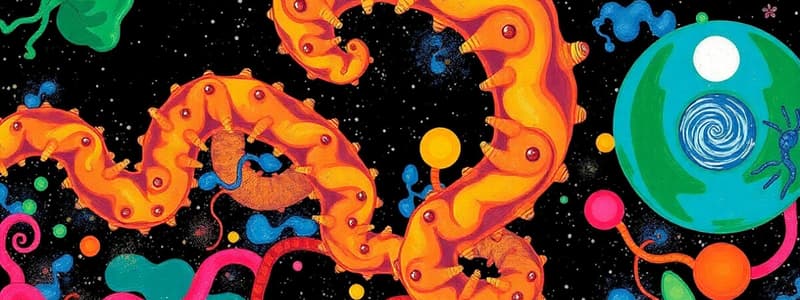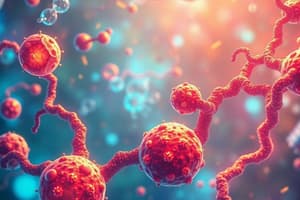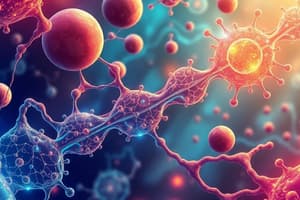Podcast
Questions and Answers
What does a high standard deviation indicate about a data set?
What does a high standard deviation indicate about a data set?
- Data points are more spread out from the mean. (correct)
- Data points are clustered tightly around the mean.
- All data points are equal.
- The data has no variability.
Which of the following is NOT a main function of metabolism?
Which of the following is NOT a main function of metabolism?
- Conversion of food to building blocks.
- Elimination of metabolic wastes.
- Conversion of energy in food to energy.
- Storage of nutrients for future use. (correct)
What role do enzymes play in metabolic reactions?
What role do enzymes play in metabolic reactions?
- They eliminate metabolic wastes.
- They convert energy into building blocks.
- They speed up and catalyze chemical reactions. (correct)
- They provide energy for the reactions.
What is the primary function of photosynthesis in plants?
What is the primary function of photosynthesis in plants?
Which process occurs in living organisms to produce ATP without oxygen?
Which process occurs in living organisms to produce ATP without oxygen?
What is a key difference between aerobic and anaerobic respiration?
What is a key difference between aerobic and anaerobic respiration?
How does energy from the Sun support life on Earth?
How does energy from the Sun support life on Earth?
What distinguishes a food web from a food chain in an ecosystem?
What distinguishes a food web from a food chain in an ecosystem?
Which statement about catabolic and anabolic reactions is correct?
Which statement about catabolic and anabolic reactions is correct?
What is the significance of fermentation in cellular metabolism?
What is the significance of fermentation in cellular metabolism?
Which of the following best describes the role of enzymes in metabolism?
Which of the following best describes the role of enzymes in metabolism?
What is a primary output of photosynthesis?
What is a primary output of photosynthesis?
Which statement describes the relationship between metabolism and energy conversion?
Which statement describes the relationship between metabolism and energy conversion?
How do food webs differ from food chains?
How do food webs differ from food chains?
What defines the standard deviation of a data set?
What defines the standard deviation of a data set?
Which statement regarding aerobic respiration is accurate?
Which statement regarding aerobic respiration is accurate?
Flashcards are hidden until you start studying
Study Notes
Standard Deviation
- Measures how data points are spread out from the mean
- Low standard deviation: data points are clustered around the mean
- High standard deviation: data points are spread further from the mean
Metabolism
- The sum of all chemical reactions within an organism
- Three main functions:
- Conversion of energy from food
- Conversion of food into building blocks (proteins, lipids, nucleic acids, carbohydrates)
- Elimination of metabolic waste
- Divided into catabolic and anabolic reactions:
- Catabolic: Breakdown of molecules, releases energy
- Anabolic: Building of molecules, requires energy
Enzymes
- Proteins that speed up (catalyze) metabolic reactions
- Most metabolic reactions are enzyme-catalyzed
Photosynthesis
- Process by which green plants and some organisms transform light energy into chemical energy
- Plants convert light energy into oxygen and glucose, using water and carbon dioxide
Cellular Respiration
- Process of breaking down glucose through chemical reactions to produce ATP, which is used as energy by the body
- Occurs in cells of all living organisms, including plants
- Can be aerobic (requires oxygen) or anaerobic (does not require oxygen)
Fermentation
- Metabolic process that converts chemical energy from carbohydrates into ATP without oxygen
- Occurs in:
- Certain microorganisms
- Skeletal muscles when oxygen is lacking
- Red blood cells
- Internal parasites
- Less efficient than respiration, but includes processes like ethanol and lactic acid fermentation, used industrially
Energy from the Sun
- Sunlight is the primary source of energy for life on Earth
- Sunlight allows plants to use photosynthesis to create organic compounds, which are then used as energy by consumers (animals)
- Organisms are connected through food chains and food webs, with food webs encompassing all food chains in an ecosystem
Standard Deviation
- A measure of data dispersion relative to the mean.
- Low standard deviation indicates data clusters tightly around the mean.
- High standard deviation indicates data is more spread out.
Metabolism
- The sum of all chemical reactions in organisms.
- Three primary functions:
- Energy conversion from food to usable energy.
- Conversion of food into building blocks like proteins, lipids, nucleic acids, and carbohydrates.
- Elimination of metabolic waste.
- Classified into catabolic and anabolic reactions:
- Catabolic reactions break down molecules, releasing energy.
- Anabolic reactions build up molecules, requiring energy.
Enzymes
- Most metabolic reactions are enzyme-catalyzed.
- Enzymes are proteins that accelerate chemical reactions in the body.
Photosynthesis
- The process by which green plants and some organisms convert light energy into chemical energy.
- Plants use light energy, water, and carbon dioxide to produce oxygen and glucose.
Cellular Respiration
- The breakdown of glucose through a series of chemical reactions to produce ATP, the energy currency of the body.
- Occurs in all living organisms, including plants.
- Respiration can be aerobic (requiring oxygen) or anaerobic (not requiring oxygen).
Fermentation
- A metabolic process that converts carbohydrate chemical energy into ATP without oxygen.
- Occurs in microorganisms, skeletal muscles during oxygen deprivation, red blood cells, and internal parasites.
- Less efficient than respiration, but includes important processes like ethanol and lactic acid fermentation.
- Widely used in industrial applications.
Energy Flow in Ecosystems
- Sunlight provides the primary energy input for life on Earth.
- Plants use photosynthesis to convert sunlight into organic compounds, serving as energy sources for consumers (e.g., animals).
- Organisms are interconnected through food chains and food webs.
- A food web represents all the food chains within an ecosystem.
Studying That Suits You
Use AI to generate personalized quizzes and flashcards to suit your learning preferences.




